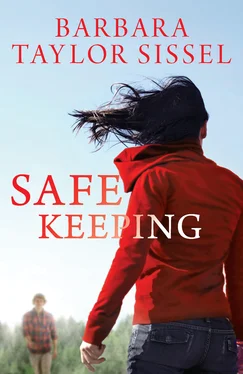“Look,” she said quickly, “maybe we did overstate a bit. It’s been tough the past several months, you know that, what with the economy, and then ever since—” She stopped before she could say Tucker’s name, say how badly business had been affected by last year’s notoriety, but her dad knew what was in her mind.
He inclined his head in the direction of the Houston Chronicle and said, “Yeah, well, it looks like the shit’s about to hit the fan again.”
“You don’t know that, Dad.”
A silence fell.
Her father broke it. “Your mother tried to call the cops to report him missing this morning. She would have, if I hadn’t stopped her.”
“She wants to find him, that’s all.”
He shook his head. “She’s losing it.”
Lissa didn’t ask what he meant, whether he thought it was her mother’s faith or her mind that was going. He looked at the newspaper, but she looked at him. She thought he was the one who was losing it. He looked so distraught. But he’d caused this, hadn’t he? He’d put himself in this position.
As if he felt her gaze, her father looked at her and said, “What?” in that tone he used when he meant to prick a nerve.
“Momma said you told Tucker to get out and not come back.”
“So?”
“So, you got what you wanted.”
“He called me, his own father, a fucking bastard and said he was a grown man and could take care of himself, which I’d like to see—just once.”
“Well, he could, if he had a job, if he had a paycheck. You cut him out of the business, Daddy! You basically disowned him. What was he supposed to do, fall all over you with kisses, his heartfelt thanks?”
“You know he blew another meeting with Carl Pederson.”
She nodded. She and Evan were as irked at Tucker as her dad, as Carl himself, was. It wasn’t easy to find a good cabinet man.
“If it was anyone else, screwing up as consistently as your brother has, I’d have fired them a long time ago,” her dad said. “Even you and Evan would have. You know I’m right.”
Lissa picked at her thumbnail. He wanted her to say he was justified in cutting Tucker from the business. And maybe he was. “Tucker is your son, not just some employee,” she said.
“I’ve given him every chance, bent over backward. Like I said to your mother this morning, the boy needs to grow up....”
And if that means he has to hit the bottom... Her dad went on.
Lissa tuned him out. Some things weren’t worth fighting over.
“Where’s Mom?” Lissa waited to ask until her dad was quiet.
“Upstairs. She’s pissed because I won’t go to the lake and see about finishing the house.”
“What’s going on with that, Dad? You always said after you retired, you were going to build that house and fish until you died.”
“I’ve got no appetite for it anymore,” he said, and his voice was raw. “You get a crew out there, pull the frame down, use the material somewhere else. Tell Evan—”
He stopped, but Lissa kept his gaze while a hundred thoughts crowded her mind. She could offer him comfort, but she didn’t know how he’d take it. He’d never needed her comfort before.
He brushed his hand over his face, and the breath he took in was huge and ragged. “Go on, little girl, and check on your momma, will you? I’m worried about her.”
“Daddy?” Lissa felt a fresh jolt of alarm. She could see his eyes were filmed with tears again. Her own throat constricted.
He waved her off. “Just let me be now.”
“Tucker will come home soon. It’ll be fine, you’ll see.”
“Sure,” he said. “It always is, isn’t it?”
She eyed him a moment longer, then left, pulling the door closed behind her. When she heard the click of the lock, she looked back, and the thought came that he shouldn’t be alone now, not with all those guns, and it chilled her momentarily. She thought of asking him to let her back in, but he’d only refuse, if he answered her at all.
Her head throbbed with every step as she climbed to the second floor. She had wakened with another brutal headache this morning that had only gotten worse. She’d had a series of them recently. They had to be sinus related, she thought.
“Mom?” she called, reaching the upstairs hallway.
“Back here,” she answered.
Lissa went toward the sound of her mother’s voice and found her sitting on a footstool in the linen closet. Her mother looked up. “Honey, what’s wrong? You’re so pale.”
“Headache,” Lissa said. “I think it’s sinus. I took some Advil, but it’s not helping.”
“Dr. White gave me something good for that last time I went to see him.” Her mother went into the bathroom next to the linen closet and returned with a glass of water and a tablet. “It works, and it won’t make you sleepy.”
Lissa took the pill and a swallow of water.
“He said to remind you that you’re overdue for a checkup.”
“I know. I’ve been putting it off.” Lissa drank the rest of the water. As much as she loved Dr. White, she wished she could see someone different for her exam, a doctor who hadn’t known her since she was six. Someone who would only see her as a condition, not as a person. In case of bad news, she thought it might be easier if it were treated with clinical dispassion. Not that she felt as if she were seriously ill. It was only that she didn’t feel herself. In addition to the frequent headaches, she wasn’t sleeping, her appetite was low and, last week, she’d fainted. She kept telling herself it was stress. She wanted it to be.
Lissa’s mother resumed her perch on the stool. “I didn’t hear you come in.”
“I wanted to check on you, you know, because of—”
“I’ve been rereading Dad’s old letters,” Lissa’s mother interrupted. She half lifted a cardboard box from her lap. “Did I ever show you this one?” She handed Lissa a sheet of onionskin paper, sepia tinged at the edges and covered in her dad’s cramped writing.
“‘My Dearest Em,’” her mother read, “‘my dearest one, my love, how will I tell you this news, the awful thing that has happened. I’m not the same, not your sweetest—not your sweetest honey—’” She caught her lip, took a breath. “‘I’m not sure I’m even a man anymore.’”
“Mom...” Lissa’s murmur was half in sorrow, half in protest.
She hadn’t read her dad’s letters home from Vietnam, but she knew how he’d been injured there. Her mother had told her and Tucker the story, how in the aftermath of battle, he’d rescued a four-year-old North Vietnamese boy, an enemy’s son, and run with him from a burning house, but before he could make it back to the location where his company was bivouacked, sniper fire had caught him in the meaty part of his calf below his left knee. Still, he’d kept running with the child; he’d brought the boy to safety against all odds, and sixty-one days later, they’d amputated the gangrenous, blasted remains of his lower leg. He’d nearly died from the infection.
Lissa was still in awe of the story. She couldn’t imagine the selfless act of courage it had taken. She remembered socking a kid once in third grade who called her dad a cripple. She’d been sent home that day for fighting, but she hadn’t been punished. Her mother only said the boy was probably frightened at the idea of her father having only one leg. It hadn’t made sense to Lissa. Her dad wasn’t different from any other dad with two legs. In fact, he was stronger than any man she knew. She never thought of him as handicapped. Most of her life, she’d scarcely been aware of it.
She gave her father’s letter back to her mother. “Daddy doesn’t look good, Mom. I’m worried about him. I don’t think I’ve ever seen him quite so shaky.”
Читать дальше












